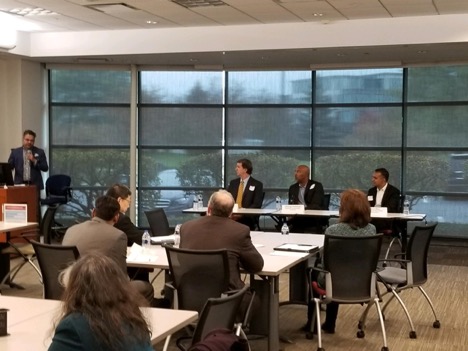
Last month, I had the honor of moderating a CIO panel at the Lake Forest Graduate School of Management at Lake Forest, IL near Chicago. The lively discussion at the panel centered around Digital Transformation driven by Cloud, Big Data and AI — and the challenges faced by CIOs leading these transformations.
First off, I must say that the three leaders on the panel were fantastic – a mix of Enterprise CIOs across Healthcare, the Federal Government and State & Local municipal services. The panelists were: Siva Balu, Head of IT at Bluecross Blueshield Association; Bill Willkowski, Head of Enterprise Architecture at Fermilab, and George Coleman, CTO – Chicago Transit Authority.
Below are the questions that I posed to the panel to guide the discussion about how to plan for a digital transformation journey and what are key requirements for a such a critical endeavor. It was evident during the discussion that my fellow panelists differed on their answers to these questions, based on their different target customers and divergent requirements. (They did all agree, though, that their organizations have to operate in a hybrid-cloud state- supporting different types of environments on-prem and in the public cloud). These categories of questions offer a framework to guide CXOs as they embark on a cloud digital transformation. I invite you to review these questions below as you’re planning your own cloud journey, to ensure you are successful and that you position your organization for success in today’s digital age.
Category 1 – The Cloud As Business Strategy
- First off, is your business demanding increasing agility in business applications? A specific ask or company initiative that is causing the organization to take a close look and evaluate their Cloud journey? Or is it more based on reducing IT cost via datacenter, tools, OS or platform consolidation?
- What tangible benefits (both business and IT) does your organization associate with cloud-based infrastructure? Are these metrics quantifiable in terms of both customer experience as well as IT efficiency? What are the drawbacks? How do you go about determining the order of importance in making choices that need to balance between customer experience and IT costs?
- Are you pursuing a hybrid cloud strategy? What are the ramifications from both an infrastructure and developer perspective? Why?
- What are industry leaders in your vertical doing around Cloud? Are there specific business use cases they are focusing on, or results that they achieved?
- What is the new Cloud technology stack in your organization? And how important is it for the components of the stack to be cloud-neutral so you can stay cloud agnostic?
Category 2 – Mode 2 or Cloud-Native Applications
- Containerization is surely gaining wide adoption. Are you seeing the same both from an existing legacy applications standpoint as well as from a greenfield standpoint?
- Cloud-native applications fundamentally change how you provision and deploy your infrastructure, and how you manage it. This is particularly true when making the jump from traditional virtual machines to containers and Kubernetes, and when you have more loosely coupled applications, such as microservices and serverless. How have you made the change organizationally to support Cloud-Native technologies?
- How important is for any technology you consider to be relevant to today’s cloud-first world?
- What do you think of the Kubernetes project? Has it made it in your tech stack?
Category 3 – Security & Disaster Recovery
- Everything is moving into the cloud these days including precious data. How can dev and Ops ensure an appropriate level of security in an increasingly fragmented landscape?
- Data is the last and most difficult IT asset to move over to the cloud. How have your data assets and data strategies changed to reflect cloud-based deployments? Or are large-scale data warehouses, systems of record and data lakes still living in-house?
- How would you design your cloud for resiliency? What is your backup/recovery policy? How well do existing policies translate into the cloud?
- How is business risk handled in the event of an outage? How has that changed in the new cloud landscape?
Category 4 – Culture
- Who leads the Cloud transformation? Infrastructure, Development, the CIOs organization or a Cloud Center of Excellence?
- How have job descriptions changed to reflect the new cloud reality? Have Sysadmins turned into SRE (Site Reliability Engineer’s) and Developers into DevOps?
- Are employees being re-trained in Cloud techniques?
- How are you making investments from both an Operations and a development team standpoint to adapt to this brave new world?
- How will your IT team, processes and mandate change in the course of your Cloud Journey? Will IT be relegated to a Service Provider or an Innovation Enabler?
Category 5 – Cloud Technology & Vendor Choices
- Who owns the SLA for uptime for your various environments or your Hybrid Cloud?
- What are your realistic ROI projections over a 3-year timeline? Does the ROI include substantial Professional Services needed for your organization to get started?
- Do the vendor or solutions you’re considering to enable your transformation offer an un-opinionated stack for application deployment?
- Do the tools and solutions you’re considering offer a certified catalog of popular open source projects to deploy applications in a cloud-agnostic manner?
- What are my chances of lock-in from a cloud provider perspective, as well as an ecosystem, API and stack standpoint?



